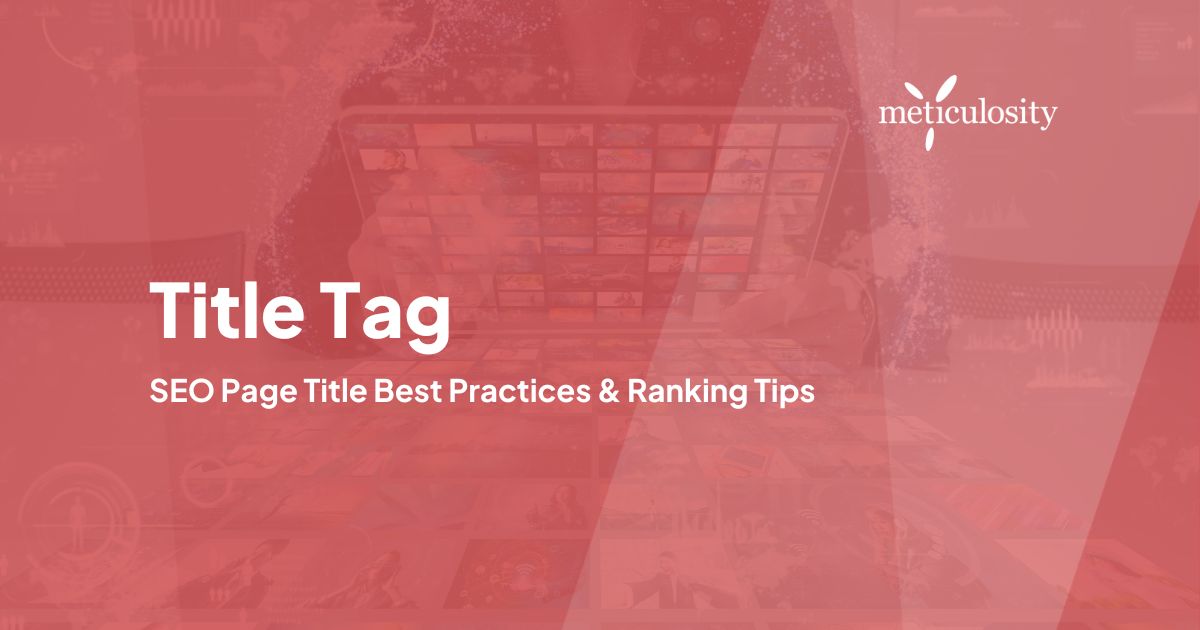Nothing is more important to a site's SEO than well-written title tags. These are the tags that appear as headlines in search engine results pages. When written correctly, people know exactly what to expect from your page, and it relates to the keyword they searched.
Marketers also refer to these tags as meta titles. In the SEO world, your page title text is like the title of a novel, and they should speak to your two most important audiences, your visitors and search engine crawlers.
Your visitors should be able to see an SEO title tag and be inspired by its relevance to what they were looking for. In addition, robots or crawlers look at your tags as a ranking signal. If your meta tags show authority and match the content on the page, then you will likely get a positive SEO ranking signal.
What is a Title Tag?
A title tag is an HTML item that defines your web page title. It's essential for SEO, social sharing & is the clickable blue link on search results (SERP).
Check your Title Tags and find critical SEO issues affecting your website’s indexability.
Examples of Meta Title Tags
In the example below, the red-underlined text are the SEO page titles. These tags describe the content and match to the keyword "is pizza good for you." When searched, these articles pop up first because they are the most trustworthy sites answering the question.
/Imported_Blog_Media/title-tag-serp-example-Jun-28-2021-10-53-14-32-PM.png?width=660&name=title-tag-serp-example-Jun-28-2021-10-53-14-32-PM.png)
To create a tag like this, you also have to know the HTML markup. If you look at the code on your web page, you should find a code snippet like this:
/Imported_Blog_Media/seo-meta-tags-html-750x309-Jun-28-2021-10-52-56-24-PM.png?width=750&name=seo-meta-tags-html-750x309-Jun-28-2021-10-52-56-24-PM.png)
Page title tag example (above):
<title>My web page title - 50-60 characters long</title>
Now that you have specified a title, it's now defined for search results, social media posts when linked, linked chat messages, browser tab titles, and any other area that displays a page title.
Best Practices for Meta Titles
When you start writing your titles, you want them to be relevant and catchy for your readers, but they also need to have essential components that robot crawlers are looking for to rank up in search engines.
Here are some things to keep in mind:
Length
Your tags should be 60 characters in length at most. Google does not actually provide a maximum length, but from search engine results, we know that only the first 50 to 60 characters are shown. If your title is any longer, it may get cut off in search engine results.
You want readers to get the complete impact of your title, which is why you should keep it short and sweet if possible. You also want to stay away from weird symbols, capital letters, or odd spellings as this can lead to negative dings from a crawler.
If you have WordPress, you can use plugins like Yoast's WordPress SEO to specify tags for every page and blog post. It also shows you a snippet preview so you can see if it displays the way you want in search engines.
/Imported_Blog_Media/Meta-Description-2-Jun-28-2021-10-53-06-90-PM.png?width=720&name=Meta-Description-2-Jun-28-2021-10-53-06-90-PM.png)
Keywords
SEO is all about the keywords you pick for your titles and meta descriptions. It's more important than the length by far. When writing out your titles, you should include the number one keyword you want to rank for on that page in the title if possible. When you optimize with the best keywords, you will instantly see a lift in your SEO in most cases.
Google also looks for keyword stuffing, so you don't want to add your keyword to every header title and paragraph. You should use your main keyword at least twice with one use being in the title. You can use variations of the keyword or related keywords to add more diversity to the page.
In addition, your main keyword should come as close to the first words in your title or the first paragraph. This lets your readers and robot crawlers know exactly what the content is about.
Write Clear and Actionable Titles
In copywriting, there are several articles of speech that are considered stop words. These are words that generally break up the flow of your title. These include the following:
- A
- But
- And
- Or
- The
- So
- Was
- With
You should use unique titles that creatively describe your page. Google also recently said that marketers should not use titles with "Home" or "profile" in the page title. Google may even change the title if you have something generic like "Home Page" listed in the tag area.
Many ecommerce stores have a ton of products, and not every page has its own unique title. It's important that you change this immediately if your site does not use unique titles for product pages. Since your pages can be created automatically when you upload products, you may need to work with your developer to add in product titles.
Action words are also essential to writing a good tag title. Some of the best action words include:
- Boost
- Create
- Build
- Learn
- Go
- Get
- Take
There are many more. If you are having trouble, you may want to try a headline formula, but these should only be used as inspiration and not word for word.
Titles tend to be confusing when they do not include a keyword. You also want to write a title that is more than three words long if you can. It should be descriptive enough that the reader knows the answer can be found if they click through.
Avoid ClickBait Headlines
Of course you want people to click on your posts and search engine results. They will do so because your title makes sense and answers their questions, but what if the content on the page is irrelevant? Ultimately, it will hurt your ranking score and social media quality to post content that isn't relevant to the title.
ClickBait titles became incredibly popular because they took advantage of users who were trying to find answers and liked the headline formulas. However, when they went to the pages, the content didn't match or never answered their questions. In fact, most of the time the information was false or read like spam.
You should create your titles so they supplement your content and readers know exactly what to expect on your web page just from reading the title.
Are Your Page Titles Optimized for Social Media?
Your page titles let readers know what information will be on the page when they click-through. It's especially important when your link a blog post or page on social media, too. This is because your page title will display automatically on Facebook or Twitter in the post's title.
/Imported_Blog_Media/title-tag-social-media-Jun-28-2021-10-53-07-69-PM.jpg?width=366&name=title-tag-social-media-Jun-28-2021-10-53-07-69-PM.jpg)
For example, if a visitor decides to share one of your product pages, but you don't have a good title specified, it could just show up with a bunch of SKU numbers or something that doesn't sell your product as well as if you wrote out the perfect title.
You should always check that your pages have the right titles with keywords or catchy taglines so that they display correctly when linked around the web.
Include Your Brand Name in the Title
If you do have a well-known brand, then you can format the title to include the brand name in the tag. While this isn't always recommended for unknown brands, it can help your click-through percentages when users know what brand they are looking at.
Since the titles are the most visible in search engine results, the brand name should be included to show that it's trustworthy and provides the right products for the keyword or search term.
/Imported_Blog_Media/title-tag-with-brand-name-Jun-28-2021-10-53-03-70-PM.png?width=750&name=title-tag-with-brand-name-Jun-28-2021-10-53-03-70-PM.png)
Always Write for Your Audience
Titles make it easier for visitors to understand your content, but you also want to make sure that you are writing to attract clicks from your main audience. You should think about the entire user experience when you write your titles so that they pertain to what your users are thinking about as well.
Google May Choose Different Titles
In some cases, Google can change the title. For example, if you specify a title in the head for the page, but you also specify a different title for social media, then Google may use the title for Facebook in the search engine result page.


/Imported_Blog_Media/title-tag-1.png)






